Overview
Securing a non-resident UK mortgage requires a clear understanding of specific eligibility criteria, including:
- Proof of income
- Credit history
- Adherence to legal and tax obligations
It is essential to recognize that navigating the complexities of the UK mortgage market can be challenging for non-residents. Therefore, working with specialized mortgage brokers can significantly streamline the application process. These experts provide tailored guidance and access to a broader range of financing options, which is crucial for non-residents facing unique hurdles in this market. By seeking professional assistance, you not only enhance your chances of approval but also gain valuable insights into the best available options for your financial situation.
Introduction
In the dynamic realm of real estate, non-resident mortgages have emerged as an indispensable resource for individuals aiming to invest in UK property from overseas. These loans come with distinct terms and conditions designed to tackle the unique challenges faced by international buyers. Therefore, grasping the intricacies of these mortgages is crucial for achieving success.
Potential borrowers must navigate the complexities of creditworthiness and understand specific eligibility criteria, equipping themselves with the necessary knowledge and guidance. As the demand for non-resident mortgages continues to surge, driven by a recovering market, this article explores the essential concepts, challenges, and strategies that can assist prospective buyers in securing their ideal properties in the UK.
Understanding Non-Resident Mortgages: Key Concepts and Definitions
Non-resident UK mortgage options are specifically tailored for individuals seeking to purchase property in the UK while residing elsewhere. These loans feature distinct terms and conditions that reflect the unique challenges and risks faced by financial institutions when dealing with non-resident UK mortgage borrowers. A fundamental concept in this context is the loan-to-value ratio (LTV), representing the percentage of the property's value that can be financed through the mortgage.
For those not residing in the area, LTV ratios typically range from 60% to 75%, depending on the lender and the borrower's financial profile.
Another critical factor is creditworthiness, which can be more complex to evaluate for non-residents. Lenders often require additional documentation to assess the financial stability of borrowers living abroad, including proof of income and credit history from their home country. Understanding these important concepts is crucial for anyone contemplating a non-resident UK mortgage while living abroad.
Current statistics indicate a growing interest in external loans, with the market showing signs of recovery following fluctuations in loan approvals over the past decade. For instance, home loan approvals in the UK experienced a significant decline during the Covid-19 pandemic but have since rebounded, reflecting a more favorable lending environment. As of 2025, the foreign property loan market is experiencing heightened activity, with lenders adjusting their products to meet the requirements of international purchasers.
Notably, the total stock of possessions increased by 7.6% from the previous quarter to 6,976, which is 42.4% higher than a year earlier, indicating a robust market.
Expert views highlight the significance of being well-informed about the specific terms and conditions related to non-resident UK mortgage loans for individuals not residing in the area. These may include higher interest rates and stricter lending criteria compared to standard residential loans. Furthermore, case studies show that numerous off-site borrowers successfully navigate these challenges by collaborating with specialized loan brokers who understand the complexities of the market.
For instance, the case study titled "UK Loan Approval Statistics Over Time" illustrates the fluctuations in approvals and the recovery post-pandemic, providing a real-world example that supports the claims made about the current market conditions.
In summary, understanding the intricacies of overseas loans, including LTV ratios and credit evaluation, is essential for potential buyers seeking a non-resident UK mortgage to invest in property in the UK from abroad. With the right knowledge and support, such as that provided by Finance Story, which offers tailored guidance and access to a wide variety of financing sources, obtaining a loan for foreign buyers can be a practical and fulfilling undertaking. Finance Story is recognized for its professionalism and deep understanding of the finance sector, ensuring that the home loan process is as seamless and enjoyable as possible for clients.
According to survey data from Just Group, the average age to settle a home loan in the UK is now 65, further contextualizing the housing landscape for non-residents.
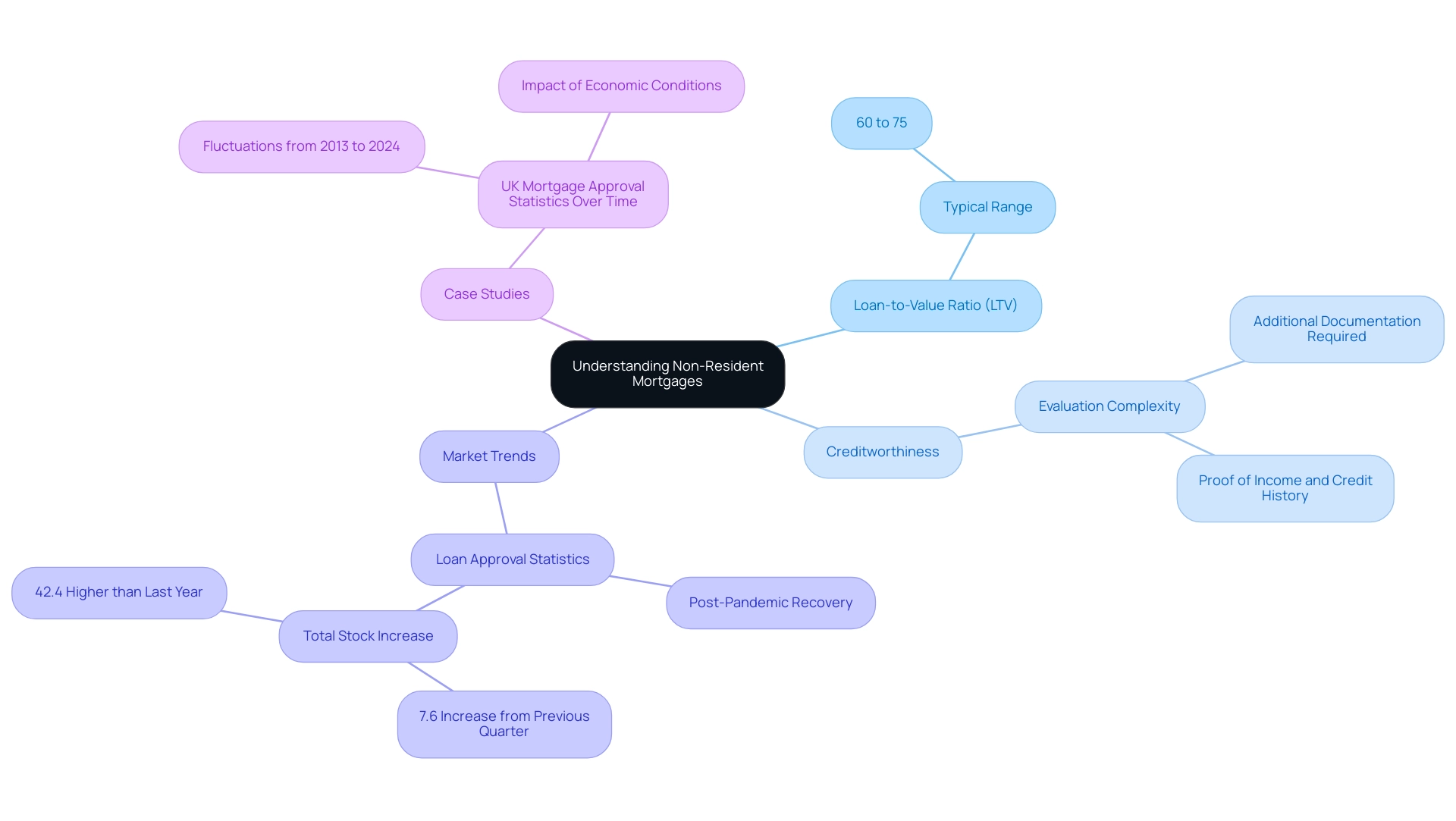
Eligibility Requirements for Non-Residents Seeking UK Mortgages
To qualify for a non-resident mortgage in the UK, applicants must navigate several essential criteria that lenders typically enforce:
- Proof of Income: Lenders require robust evidence of stable income. Acceptable documentation may include payslips, tax returns, or bank statements. This requirement is crucial, as it demonstrates the applicant's ability to meet mortgage repayments. Finance Story provides tailored assistance to help you collect and present this documentation effectively, ensuring you meet financial institution expectations.
- Credit History: A solid credit score is vital for approval. Non-residents may need to provide credit reports from their home country, which can assist financial institutions in evaluating their financial reliability. In 2025, the proportion of foreign property loan requests approved in the UK indicates an increasing openness to international purchasers, with numerous financial institutions adjusting their standards to serve this group. Notably, the value of new loan commitments was 50.7% higher than a year earlier, indicating a robust market for non-resident loans. With Finance Story's expertise, you can navigate these requirements with ease.
- Deposit Requirements: Most lenders expect a minimum deposit of 25% of the property's value. This substantial upfront investment not only secures the loan but also indicates the applicant's commitment to the purchase. Our team at Finance Story can guide you through the process of securing the necessary funds and understanding the implications of your deposit.
- Visa Status: Applicants must possess a valid visa that permits property acquisition in the UK. This requirement ensures that the buyer has legal standing to engage in real estate transactions. Finance Story is well-versed in the nuances of visa requirements and can assist you in ensuring compliance.
Understanding these eligibility requirements is vital for non-residents to effectively evaluate their chances of obtaining a non-resident UK mortgage. For example, applicants frequently encounter challenges like elevated interest rates and restricted lender options, which can complicate the loan application process. Finance Story's expertise in managing these complexities has proven invaluable, as illustrated in the case study titled 'Navigating Challenges: Common Hurdles for Expat Loan Applicants,' where clients successfully navigated the expat loan landscape with tailored support.
In 2025, expert advice emphasizes the importance of preparing comprehensive documentation to meet proof of income requirements. Examples of acceptable proof include employment contracts, dividend statements for self-employed individuals, and rental income documentation for property owners. As Jonathan Samuels, Chief Executive of Octane Capital, notes, "the data originates from property consultancy Savills," highlighting the importance of understanding the current market dynamics.
By being well-prepared and informed about the eligibility criteria, individuals from abroad can improve their opportunities for obtaining a loan in the UK.
Client Testimonial: "Finance Story made the loan process seamless for us as we navigated our non-resident UK mortgage." Their guidance was invaluable, and we felt supported every step of the way!" - Natasha B, VIC.
With Finance Story by your side, you can access the best products on the market tailored to your needs. Contact us today to begin your journey towards securing your non-resident loan!
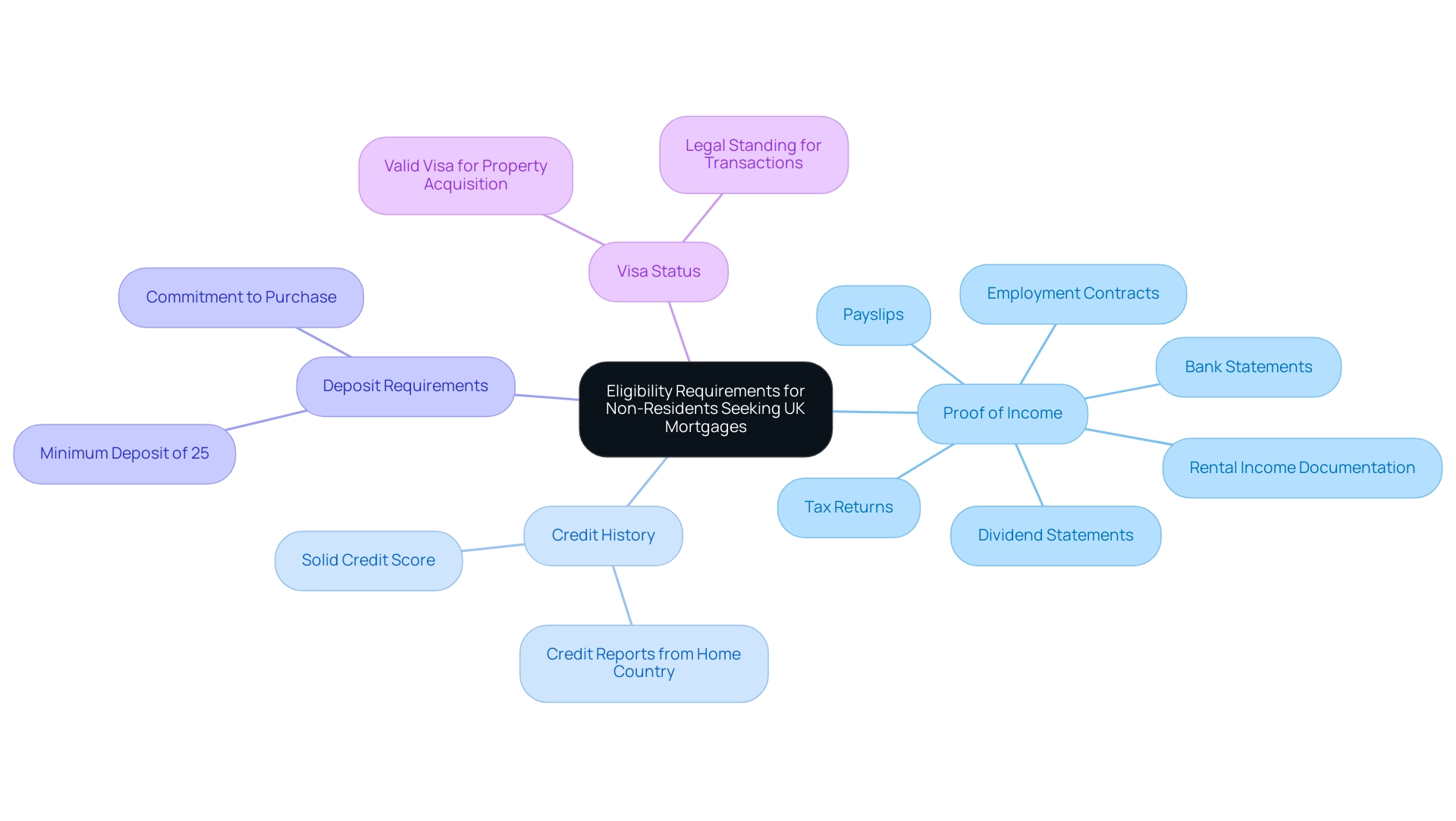
Navigating Challenges: Common Hurdles for Non-Resident Mortgage Applicants
Navigating the complexities of securing a non-resident UK mortgage presents applicants with a range of significant challenges. Understanding these obstacles is crucial for successfully obtaining financing in a foreign market. Key issues include:
-
Documentation Requirements: Gathering the necessary paperwork can be particularly intricate for individuals not residing in the UK. This is especially true when international financial records are involved. Applicants must provide proof of income, credit history, and identification, which can vary significantly from one country to another. Such complexity often leads to delays and confusion, making it essential for applicants to be well-prepared.
-
Higher Interest Rates: Many financial institutions impose higher interest rates for non-residents due to perceived risks. This can greatly affect the overall cost of borrowing, underscoring the importance for applicants to shop around and compare offers from different institutions to secure the most favorable terms.
-
Limited Financing Choices: The number of financial institutions willing to lend to non-residents is often restricted. Since 2007, approximately 340 regulated mortgage providers and administrators have submitted a Mortgage Lending and Administration Return each quarter, highlighting the competitive landscape. This limitation reduces available choices for applicants, compelling them to compete for favorable terms among a smaller group of lenders. Therefore, it is imperative for those not residing in the area to understand which lenders are more amenable to their circumstances.
-
Currency Fluctuations: Variations in currency exchange rates can profoundly impact the affordability of loan repayments. For example, if the value of the applicant's home currency declines against the British pound, the cost of monthly payments can increase. Strategies such as fixing exchange rates, maintaining a UK bank account, and selecting the appropriate currency can help mitigate these risks, allowing applicants to manage their financial commitments more effectively. The case study titled "Mitigating the Impact of Currency Fluctuations" illustrates how these strategies can successfully address currency risks.
By being aware of these challenges, applicants can better prepare themselves for the complexities of obtaining financing. Insights from industry experts emphasize the importance of thorough preparation and strategic planning in overcoming these obstacles. As noted by Just Group, the average age to pay off a home loan in the UK is now 65, highlighting the long-term implications of borrowing. Additionally, recent policy measures disclosed in the Budget slightly decrease fiscal headroom, which could affect lending conditions and should be recognized in the context of loans for foreign buyers.
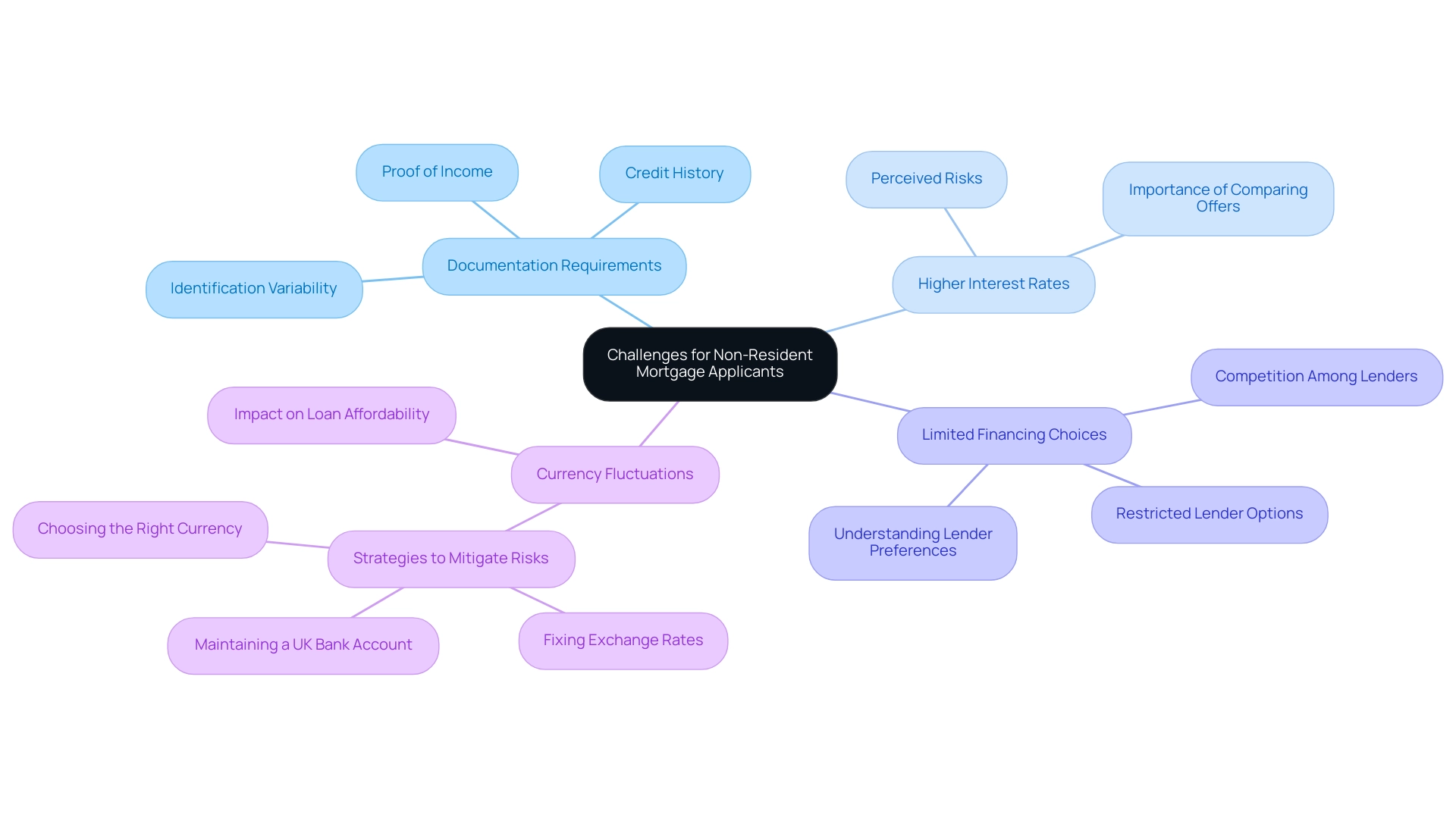
Enhancing Your Chances: Tips for Securing a Non-Resident Mortgage
To significantly improve your chances of securing a non-resident mortgage in the UK, consider the following strategies:
-
Engage a Specialized Mortgage Broker: Working with a broker who focuses on mortgages for individuals living abroad can open doors to a wider range of financing options and offer customized assistance throughout the application process. Brokers possess in-depth knowledge of the market and can effectively navigate the complexities of non-resident UK mortgage applications. Finance Story, known for its professionalism and deep understanding of the finance sector, exemplifies how a specialized broker can enhance your chances of success. Schedule your free personalized consultation with Finance Story's Head of Funding Solutions, Shane Duffy, to discuss your unique needs and goals.
-
Organize Comprehensive Documentation: Ensure that all necessary financial documents are meticulously prepared and readily accessible. This includes proof of income, credit history, and any other relevant financial statements. A well-structured application can simplify the approval process and showcase your readiness to financial institutions.
-
Establish a UK Bank Account: Maintaining a UK bank account can serve as a crucial indicator of your financial ties to the country. This can enhance your credibility with lenders, as it shows a commitment to the UK financial system and may positively influence their assessment of your application.
-
Explore Joint Applications: If possible, consider applying for the loan jointly with a UK resident. This strategy can bolster your application by leveraging the financial standing of the UK resident, thereby increasing the likelihood of approval.
Implementing these strategies can significantly enhance your loan application success rate. Recent statistics indicate that gross mortgage advances have surged by 29.9% compared to the previous year, highlighting a growing market for mortgages aimed at foreign buyers. Additionally, brokers have reported higher success rates for non-resident UK mortgage applications, underscoring the benefits of professional assistance in navigating the lending landscape.
As Tim Parkes, chief executive of RAW Capital Partners, observes, "For the market to keep pace with the evolving nature of the global investment landscape, brokers and financiers must collaborate to broaden their offerings and develop financial products that accommodate a wider range of borrowers." By utilizing the knowledge of a loan broker like Finance Story and adhering to these tips, you can position yourself advantageously in the competitive UK lending market. Moreover, Finance Story's dedication to innovation and flexibility in lending, as demonstrated in the case study titled 'Innovation and Adaptability in Lending,' highlights how their access to a varied portfolio of lenders can assist foreign applicants.
Don't hesitate to book your free personalized consultation today and let us help you navigate your next home loan with ease.
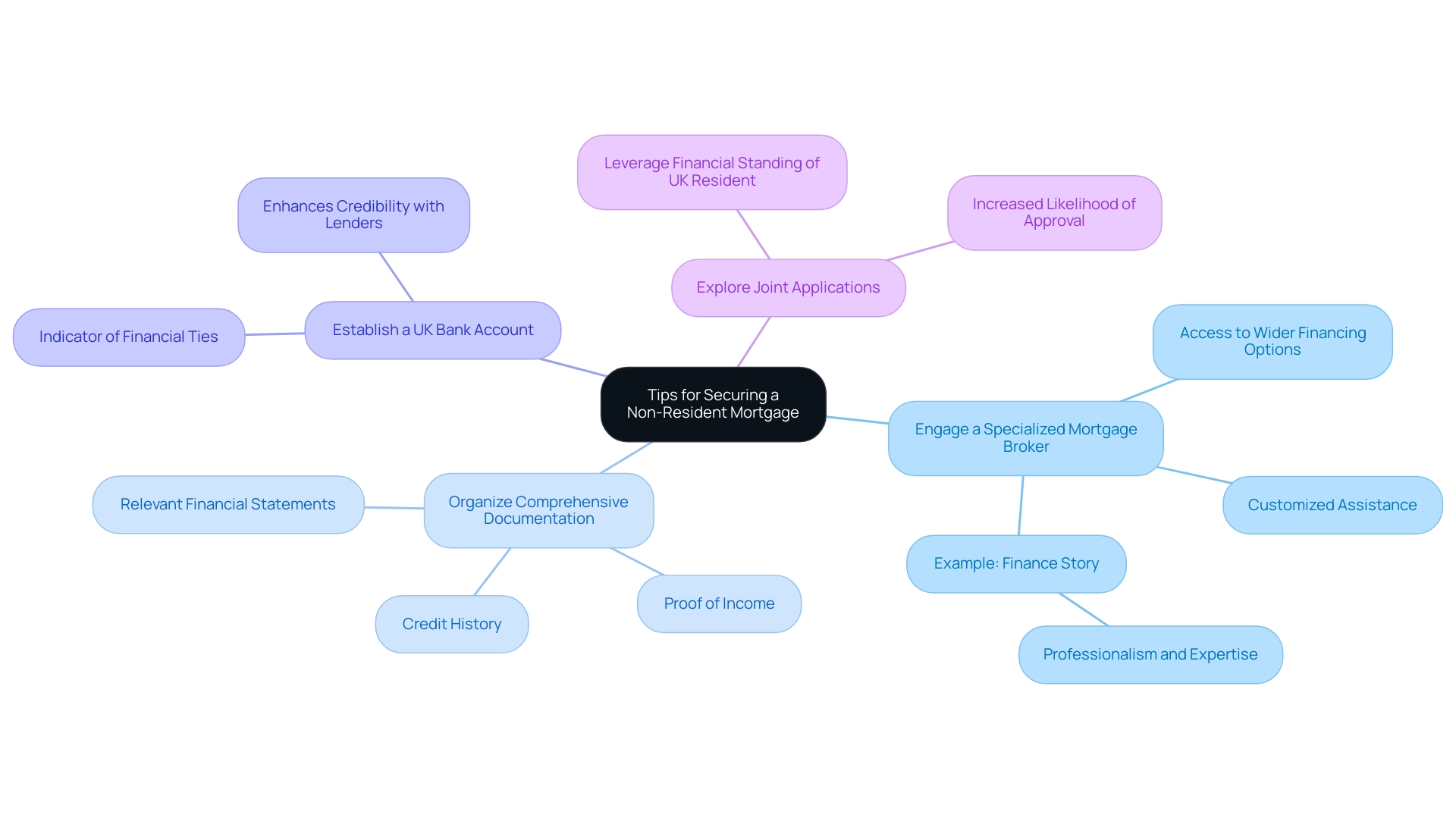
Exploring Mortgage Options: Types Available for Non-Residents
Non-residents exploring financing options in the UK can benefit from a variety of non-resident UK mortgage choices tailored to their unique circumstances. Key options include:
- Buy-to-Let Mortgages: Particularly advantageous for investors aiming to purchase rental properties, these loans enable non-residents to finance properties intended for generating rental income. This segment has seen a notable increase in market share among those seeking a non-resident UK mortgage in 2025.
- Residential Loans: Designed for personal use, these loans allow individuals not residing in the area to obtain financing for properties they plan to inhabit. This option is ideal for those looking to establish a residence in the UK.
- Interest-Only Loans: Some providers offer interest-only loan options, enabling borrowers to pay solely the interest for an initial duration. This can significantly lower monthly payments at the outset, making it an appealing option for individuals managing cash flow while not residing in the area.
- Specialist Lender Products: Certain lenders focus solely on individuals living abroad, providing customized loan options that consider the distinct financial circumstances of international purchasers. These tailored solutions can offer more advantageous terms and conditions compared to standard offerings.
Understanding these loan types is crucial for non-residents to identify the best fit for their investment or residential needs, especially when considering a non-resident UK mortgage. Notably, UK home loans are most commonly approved between August and October, with an average of around 67,000 approvals each month, highlighting the importance of timing in loan applications.
As of Q4 2023, the trend indicates that 60.5% of UK home loans had a loan-to-value (LTV) ratio of 75% or less, reflecting a growing preference for larger deposits among prospective buyers. This shift underscores the significance of comprehensive financial planning when evaluating loan options. The case study on LTV ratios illustrates the trend of homeowners saving for larger deposits, which is particularly relevant for a non-resident UK mortgage.
In the current landscape, the Financial Conduct Authority (FCA) and the Prudential Regulation Authority (PRA) oversee lenders, ensuring transparency and accountability in the lending process. Their quarterly publications on home loan lending data provide valuable insights into market trends, assisting individuals not residing in the area in making informed choices about a non-resident UK mortgage.
Additionally, fixed-rate home loans in the UK offer a set interest rate for a period of 2, 3, or 5 years, after which borrowers may switch to a variable rate or opt to refinance. This information is essential for individuals contemplating their long-term financial strategies regarding a non-resident UK mortgage.
As the market develops, expert analysis indicates that individuals should stay alert to the shifting dynamics of loan offerings, particularly the non-resident UK mortgage in the buy-to-let sector, which continues to draw considerable attention from global investors. Based on survey information from Just Group, the typical age to settle a home loan in the UK is currently 65, highlighting the long-term consequences of financing decisions for those considering a non-resident UK mortgage.
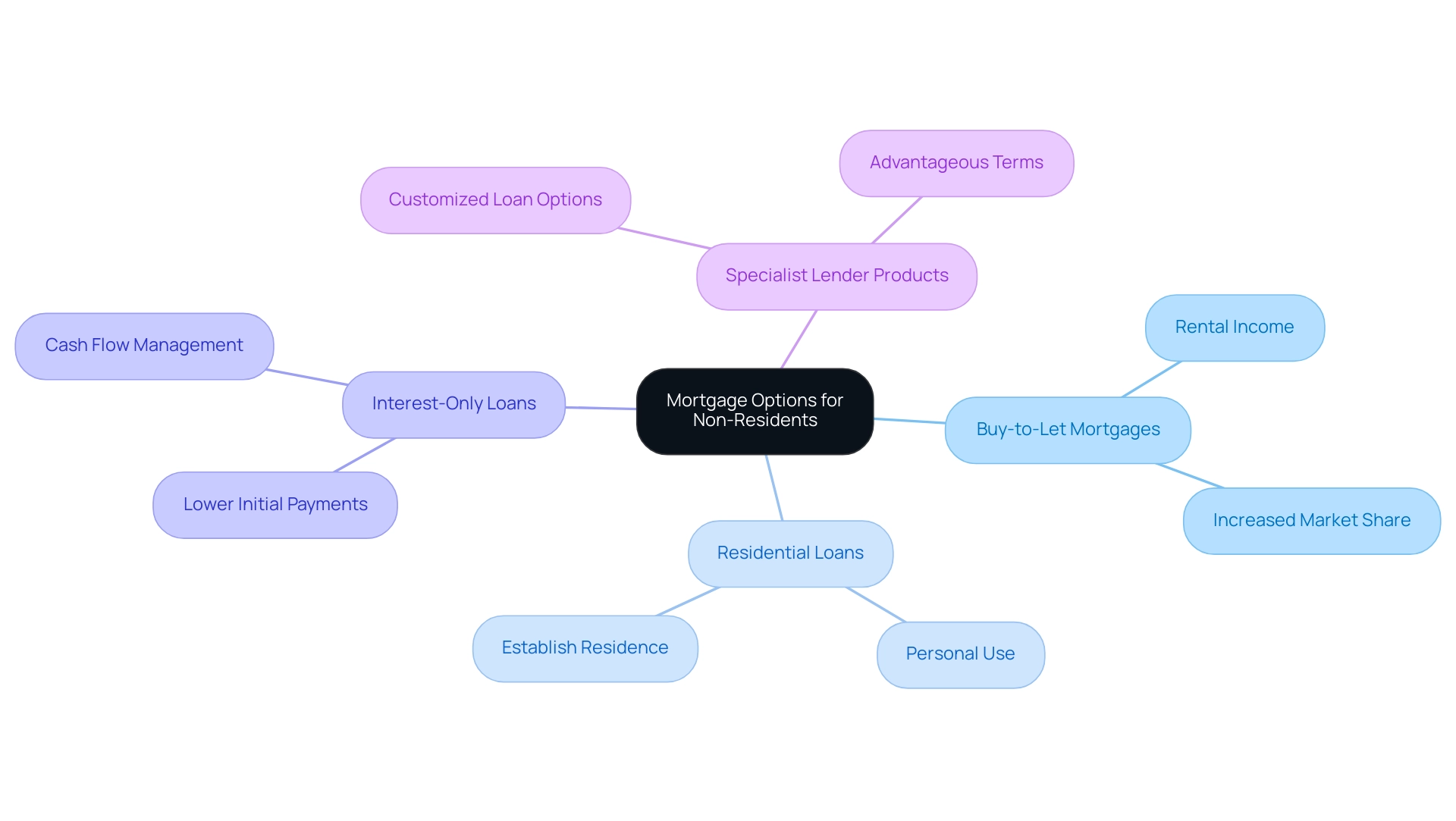
The Role of Mortgage Brokers: How They Can Assist Non-Residents
Mortgage brokers play a crucial role in guiding non-residents through the complexities of mortgage applications, offering several key advantages:
- Access to Specialized Lenders: Brokers maintain connections with a diverse range of lenders, including those focused on non-resident UK mortgage loans. This extensive network significantly boosts the chances of securing suitable financing options tailored to individual circumstances.
- Expert Navigation of Regulations: For non-residents seeking a non-resident UK mortgage, understanding the legal and regulatory landscape in the UK can be overwhelming. Brokers provide invaluable assistance in navigating these requirements, ensuring that clients remain well-informed and compliant throughout the financing process.
- Customized Financial Solutions: By evaluating each client's unique financial situation, brokers can recommend financing products that best align with their needs and objectives. This personalized approach is essential, particularly in a market where projected loan rates for a non-resident UK mortgage are expected to range between 4% and 5% in 2025.
- Streamlined Application Process: The mortgage application process can be intricate and time-consuming. Brokers alleviate this burden by managing the necessary paperwork and facilitating communication with lenders, thereby simplifying the non-resident UK mortgage process for those not residing in the area.
Finance Story exemplifies these advantages with its reputation for professionalism and a deep understanding of the finance sector, assisting clients in achieving their financial goals. With a comprehensive portfolio of private and boutique commercial investors, Finance Story ensures a variety of financing options are accessible to clients. As Natasha B. from VIC noted, "I will definitely be recommending your business to anyone. We are finished with the constant worry. Once again, thank you so much for being a part of our journey." This testimonial reflects Finance Story's commitment to providing customized solutions for a non-resident UK mortgage, ensuring a seamless experience.
The role of loan brokers is further underscored by expert opinions in the industry. As stated by Alpa Bhakta, CEO of Butterfield Mortgages Limited, "With activity levels anticipated to increase in the upcoming months, it’s crucial that brokers keep looking for lenders who can offer customized solutions to ensure all of their clients can access the financial support they require to invest in UK real estate with confidence."
Real-world examples illustrate the effectiveness of brokers in assisting non-residents with a non-resident UK mortgage. Consider Sarah's journey. A primary school educator living in Singapore, Sarah faced significant challenges in obtaining a loan to return to Australia, struggling with income verification and fluctuating exchange rates.
With the specialized support of Finance Story, she successfully navigated these complexities, realizing her dream of settling in Melbourne. This case exemplifies how Finance Story's tailored approach made a substantial difference in her experience, showcasing the brokerage's effectiveness in assisting applicants from abroad with a non-resident UK mortgage.
Statistics further highlight the impact of broker assistance, as a growing reliance on specialist lenders reflects the need for customized solutions in the home loan market. As brokers continue to adapt to the evolving landscape, their role in assisting with non-resident UK mortgage applications remains vital for achieving financial objectives. Engaging with Finance Story about your next home loan is as easy as 1, 2, 3. Save yourself the time and let us handle the hard work to find the very best value products on the market.
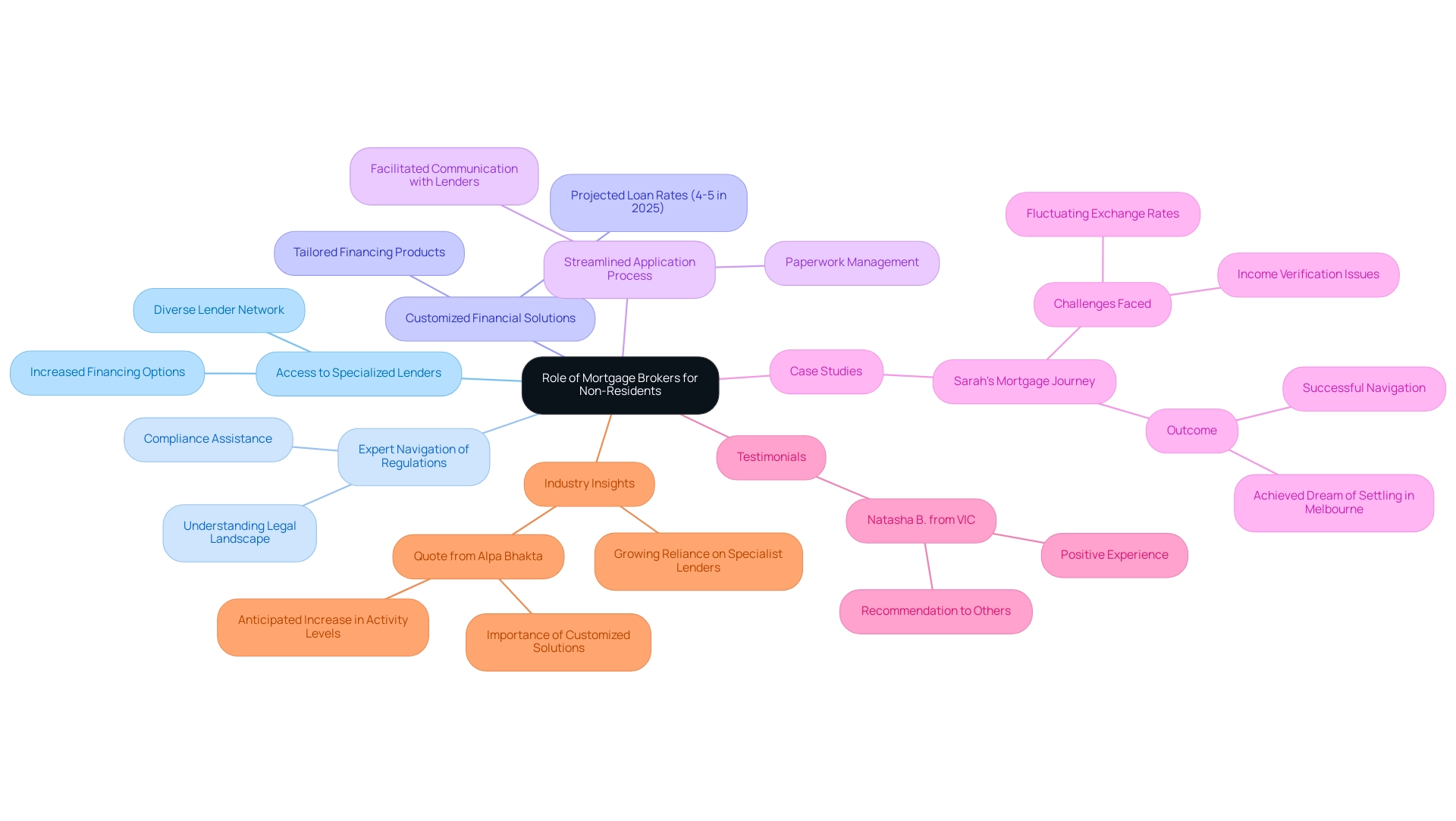
Essential Documentation: What Non-Residents Need to Provide
When applying for a non-resident UK mortgage, preparing several key documents is crucial to facilitate a smooth application process. The essential documentation includes:
-
Proof of Identity: A valid form of identification, such as a passport, is mandatory. This document verifies your identity and is a fundamental requirement for lenders.
-
Proof of Income: Applicants must demonstrate their financial stability through various documents, including payslips, tax returns, and bank statements. These documents provide a clear picture of your income and financial health, which financial institutions will evaluate to determine your ability to repay the mortgage.
- Credit Reports: Non-residents should obtain credit reports from their home country. These reports are essential for financial institutions to assess your creditworthiness and financial behavior, aiding them in making informed lending decisions.
- Deposit Evidence: Documentation that shows the source of your deposit funds is often required. This is particularly important for compliance with anti-money laundering regulations. Providing clear evidence of where your deposit originates can prevent delays in the application process.
Gathering these documents in advance can significantly speed up the loan application process. On average, applicants may take several weeks to compile the necessary paperwork, so starting early is advisable. Comprehending the particular proof of identity criteria is also crucial; for example, lenders generally ask for a government-issued ID alongside a recent utility bill or bank statement to verify your address.
In 2025, as the environment for non-resident UK mortgages changes, being well-prepared with the appropriate documentation will not only simplify your application but also increase your chances of securing advantageous loan terms. Notably, forecasts suggest that by Q3 2025, approximately 7.2% of all UK home loans may have an LTV of 90% or higher, indicating a competitive market.
Additionally, applicants should be aware of the various fees associated with obtaining a UK home loan, such as booking and arrangement fees, which can add to the overall cost. Being aware of these fees is essential for budgeting effectively and preventing unexpected expenses during the loan process. As highlighted by Just Group, a further third (32%) of applicants reported extending their loan to fund home improvements, reflecting current trends that may impact your financial planning.
Lastly, it is important to note that the Bank of England has made changes to the submission platform, requiring submissions in XBRL instead of XML since December 2022. This change may be relevant for applicants navigating the loan process, ensuring compliance with the latest regulatory requirements.
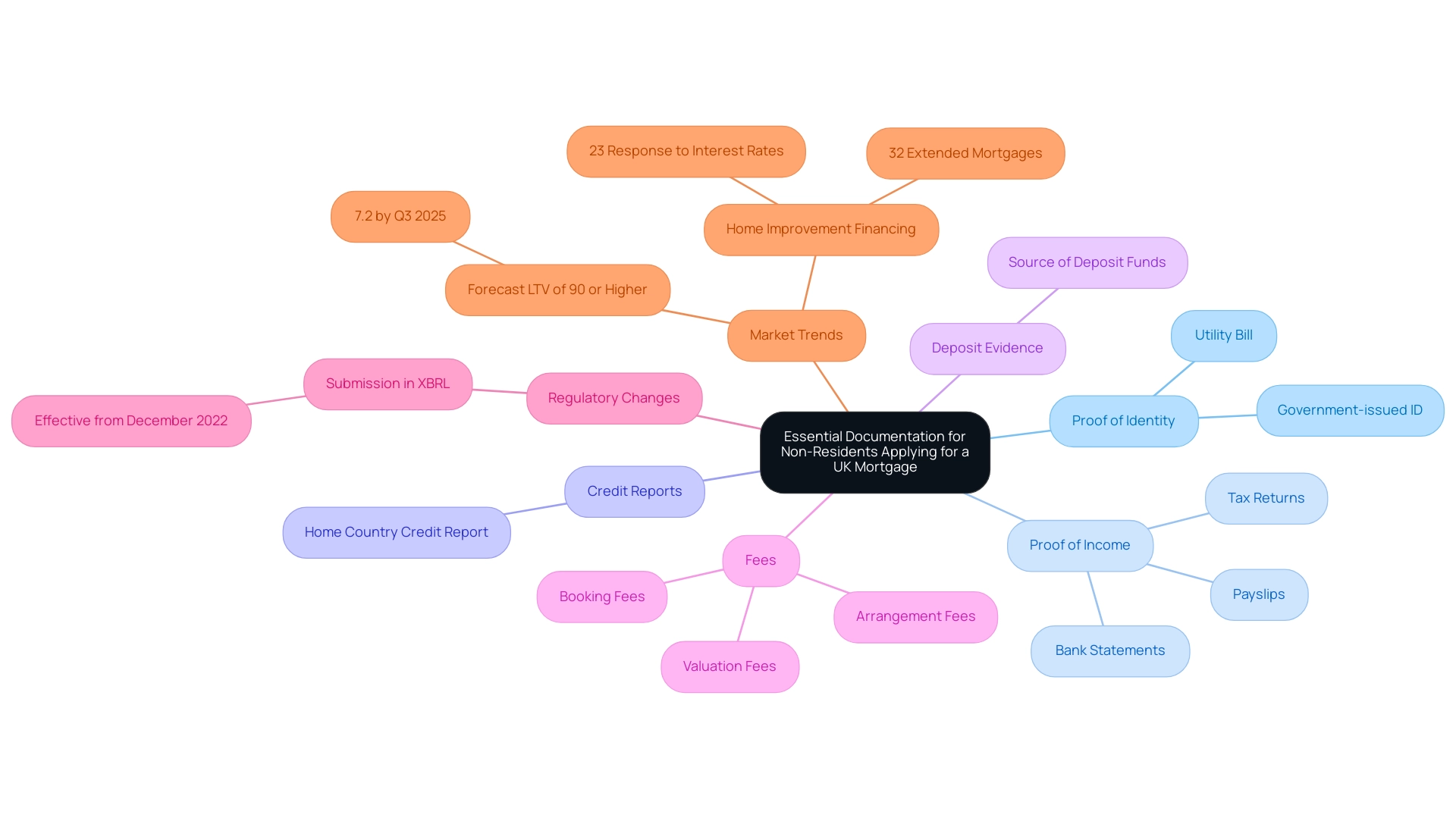
Step-by-Step Guide to the Non-Resident Mortgage Application Process
The external property loan application process represents a structured journey that can be navigated effectively by adhering to these essential steps:
-
Initial Consultation: Begin by meeting with a loan broker who specializes in non-resident UK mortgage financing. This discussion will clarify your financial situation and explore various loan options tailored to your needs.
Gather Documentation: Compile all necessary documents, including proof of identity, income statements, and credit history. Having these documents ready will facilitate a smoother application process. -
Pre-Approval: Obtain a loan pre-approval to determine how much you can borrow. Lenders typically lend around 4.5 times your annual income, making this step crucial as it not only sets your budget but also strengthens your position when making offers on properties. As noted by experts, obtaining pre-approval can significantly enhance your chances of securing a loan. Laura Hamilton, a financing expert, emphasizes that while bad credit doesn't necessarily mean you won't be accepted for a loan, it can limit the deals available to you.
Property Search: With pre-approval in hand, start searching for properties that align with your criteria. This phase is vital for identifying potential investments that meet your financial goals. -
Formal Application: Once you have chosen a property, submit your formal loan application along with all necessary documentation. Ensure that all information is accurate and complete to avoid delays. It's worth mentioning that in Australia, the primary types of home loans include fixed-rate, variable rate, split-rate, and interest-only options, which are comparable to loan products available in the UK.
Underwriting Process: The lender will conduct a thorough review of your application and documentation during the underwriting process. This assessment determines your eligibility based on various factors, including your creditworthiness and the completeness of your documentation. Several factors can influence the speed of a loan application, such as credit history, accuracy of personal information, completeness of documentation, property issues, and delays in the property chain. Awareness of these factors enables clients to proactively tackle potential delays, ensuring a smoother loan application experience. -
Offer Issuance: If your application is approved, you will receive a loan offer outlining the terms and conditions of the financing. This document is critical as it details your obligations and the lender's expectations.
-
Completion: Finally, finalize the loan agreement and complete the purchase of the property. This step signifies the culmination of your efforts and the start of your investment journey.
Understanding the average time for a non-resident UK mortgage approval can also help manage expectations. Factors such as credit history, the accuracy of personal information, and the completeness of documentation can significantly influence processing times. By being aware of these elements, clients can proactively address potential delays, ensuring a smoother loan application experience.
Successful case studies demonstrate that with careful preparation and guidance, individuals can effectively navigate the financing landscape for a non-resident UK mortgage, securing favorable terms and achieving their property ownership goals.
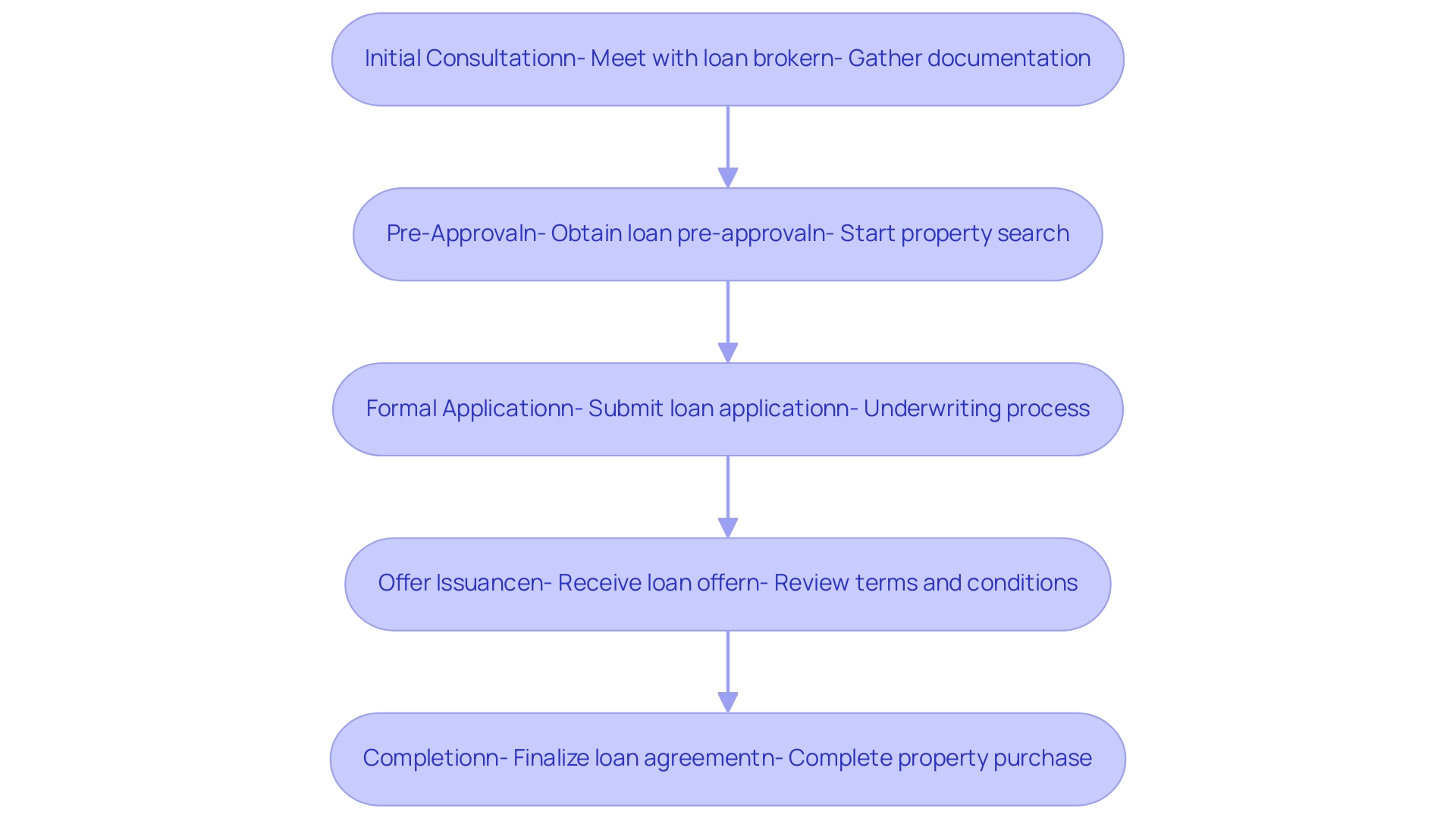
Legal and Tax Considerations for Non-Residents Securing UK Mortgages
Non-residents must navigate a range of legal and tax considerations when securing a non-resident UK mortgage, significantly impacting their investment decisions. Key areas to focus on include:
-
Stamp Duty Land Tax (SDLT): Non-residents face higher rates of SDLT when purchasing property in the UK. As of 2025, current rates reflect an additional 2% on top of the standard rates. Therefore, it is essential for buyers to utilize a stamp duty calculator to determine the exact amount payable based on property value and buyer status. This tool provides clarity on potential costs before making a purchase.
-
Tax Implications: Understanding the tax landscape is crucial for individuals living outside the country. Rental income generated from UK properties is subject to UK income tax, and non-residents must also be aware of capital gains tax when selling properties. For instance, a non-resident selling a property in the UK may face capital gains tax on any profit made, which can affect overall returns on investment.
-
Legal Obligations: Adhering to UK laws concerning property ownership is mandatory for individuals not residing in the country. This includes compliance with registration and reporting requirements, which can be complex. Engaging with a legal professional specializing in UK property law can help ensure that all obligations are met.
-
Inheritance Tax: Non-residents may be liable for UK inheritance tax on their UK property holdings. This tax can significantly impact estate planning, especially for those with substantial assets. Consulting with a tax advisor can provide clarity on how to structure ownership to mitigate potential tax liabilities.
A case study exemplifying these considerations involved a client who worked with Holly, a financing specialist, to navigate the complexities of buying and selling properties in the UK. The client reported a smooth process, highlighting how Holly's expertise in legal and tax implications was instrumental in ensuring compliance and optimizing financial outcomes. This experience underscores the importance of professional assistance in addressing these challenges.
In summary, individuals not residing in the UK who seek a non-resident UK mortgage should be well-informed about SDLT, tax implications, legal obligations, and inheritance tax. Engaging with knowledgeable professionals can provide the necessary insights to navigate these challenges effectively. Readers can expect to spend an average of 6 minutes on related blogs, making it worthwhile to delve into these critical topics.
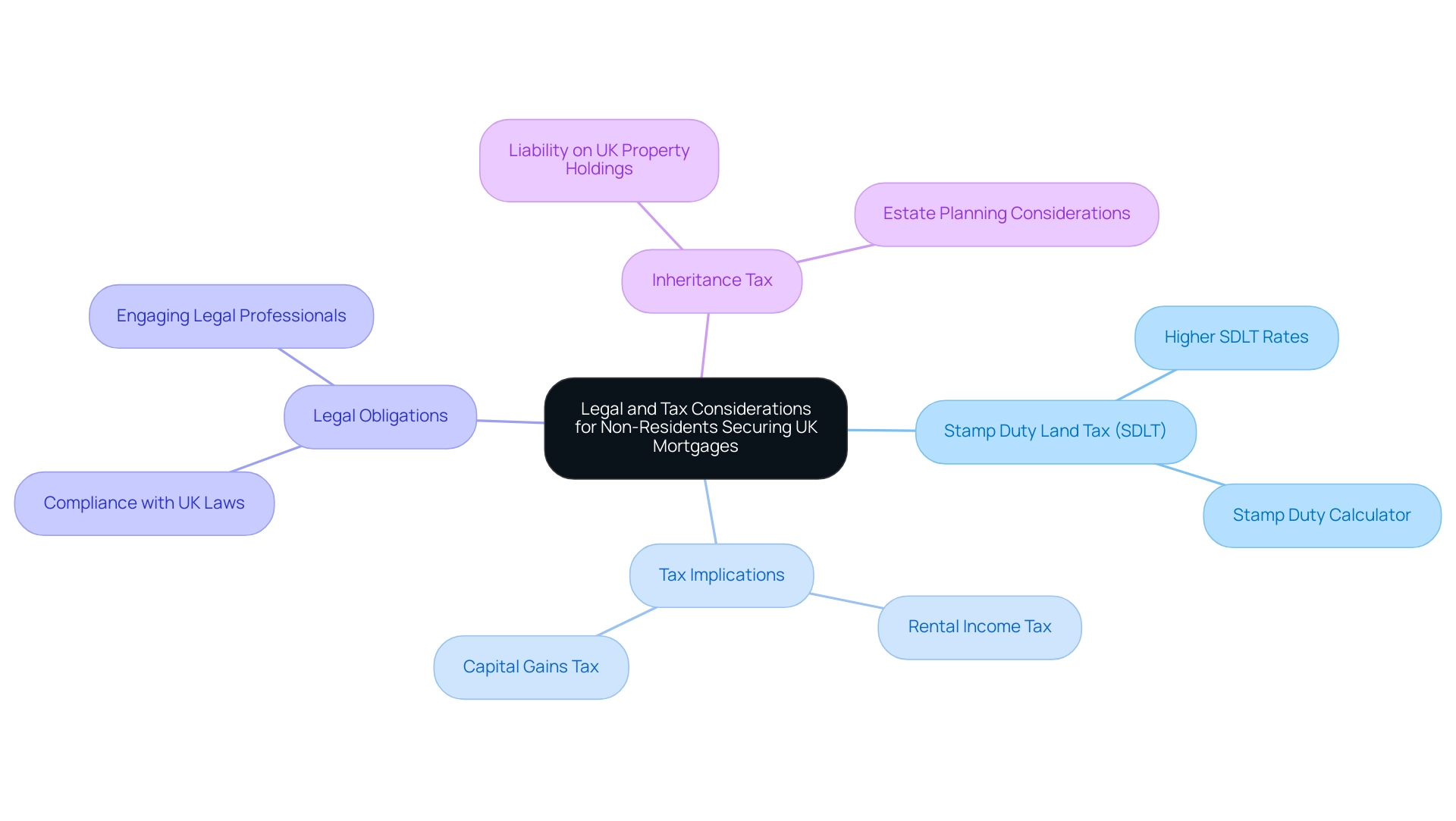
Key Takeaways: Your Path to Securing a Non-Resident UK Mortgage
Securing a non-resident UK mortgage presents unique challenges and requirements that must be navigated carefully. Here are essential takeaways to enhance your chances of success:
- Understand Eligibility Criteria: Familiarize yourself with the specific eligibility requirements for non-residents. This includes knowing the documentation needed, such as proof of income, credit history, and identification.
- Engage a Loan Broker: Collaborating with a knowledgeable loan broker can significantly ease the complexities of the application process. Brokers have access to a diverse portfolio of lenders and can tailor options to your unique circumstances, ensuring you find the best fit for your needs. At Finance Story, our Head of Funding Solutions, Shane Duffy, is ready to assist you in navigating these complexities. Book your free personalized 30-minute consultation today to discuss your needs and goals!
- Legal and Tax Considerations: Be aware of the legal and tax implications associated with property ownership in the UK. Understanding these factors is crucial, as they can impact your overall investment strategy and financial obligations.
- Thorough Preparation: Preparing meticulously can greatly enhance your chances of obtaining a home loan. This includes gathering all necessary documentation, understanding the market, and being ready to demonstrate your financial stability.
In 2025, total loan advances for foreign buyers are anticipated to be 29.9% greater than the prior year, according to UK Finance, suggesting an expanding opportunity in this sector. However, it is essential to navigate the landscape with care, as common pitfalls include misunderstanding eligibility criteria and failing to provide adequate documentation. As James Tatch, Head of Analytics at UK Finance, advises, "Any customer who finds themselves in financial difficulty should speak to their financial institution at an early stage, as the industry continues to provide a range of tailored support options to anyone who needs help."
By adhering to these guidelines, individuals from abroad can effectively navigate the UK home finance landscape and work towards achieving their property ownership aspirations. Engaging with experts in the field, like those at Finance Story, can provide additional insights and support for a non-resident UK mortgage, ensuring a smoother application process and a higher likelihood of success. Our innovative lending process, as emphasized in client testimonials, demonstrates how our access to a diverse portfolio of lenders can assist non-residents with a non-resident UK mortgage, offering customized options that improve the likelihood of obtaining financing.
As one satisfied client, Natasha B. from VIC, stated, "I will definitely be recommending your business to anyone. We are finished with the constant worry. Once again, thank you so much for being a part of our journey."
Remember to stay informed about market trends, with the next edition of mortgage lending statistics set to be published on 10 June 2025.
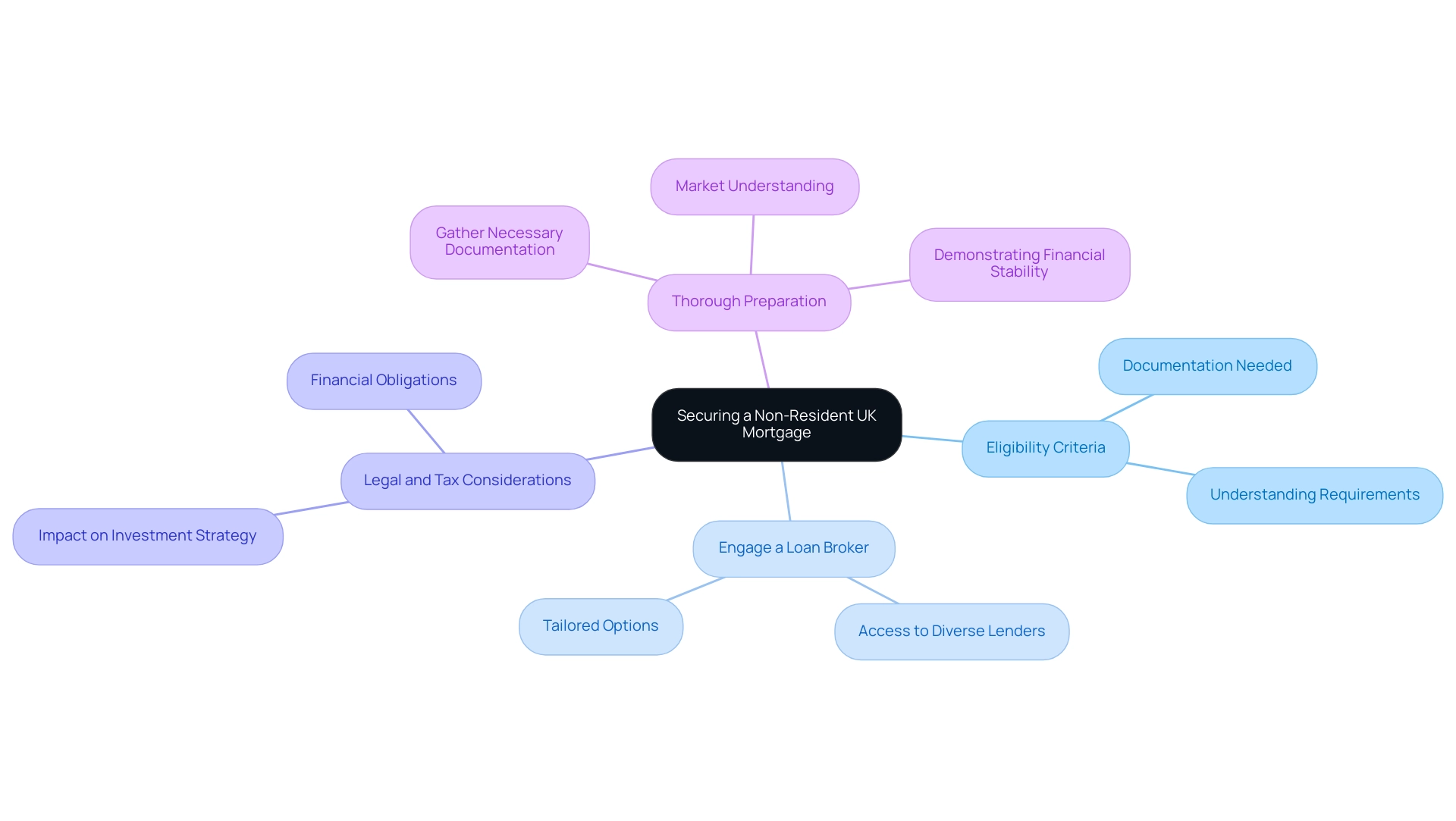
Conclusion
Navigating the complexities of non-resident mortgages in the UK necessitates a comprehensive understanding of the unique challenges and opportunities that international buyers encounter. Prospective borrowers must grasp essential concepts such as loan-to-value ratios and credit assessments, alongside specific eligibility requirements. Equipping oneself with the right information and support is paramount. This article underscores the significance of documentation, emphasizing that proof of income, credit history, and identification are crucial for a successful application.
Furthermore, the role of specialized mortgage brokers is indispensable. They offer invaluable guidance, access to a broader range of lenders, and expertise in navigating the legal and regulatory landscape. By collaborating closely with professionals like Finance Story, non-residents can markedly enhance their chances of securing favorable mortgage terms tailored to their needs.
In summary, while the path to securing a non-resident mortgage in the UK presents its challenges, proper preparation and the right support make property ownership attainable. Understanding the legal and tax implications, engaging with knowledgeable brokers, and meticulously preparing documentation can pave the way for a smoother application process. As the market continues to evolve, staying informed and proactive will empower non-resident buyers to make informed decisions and successfully invest in UK property.

